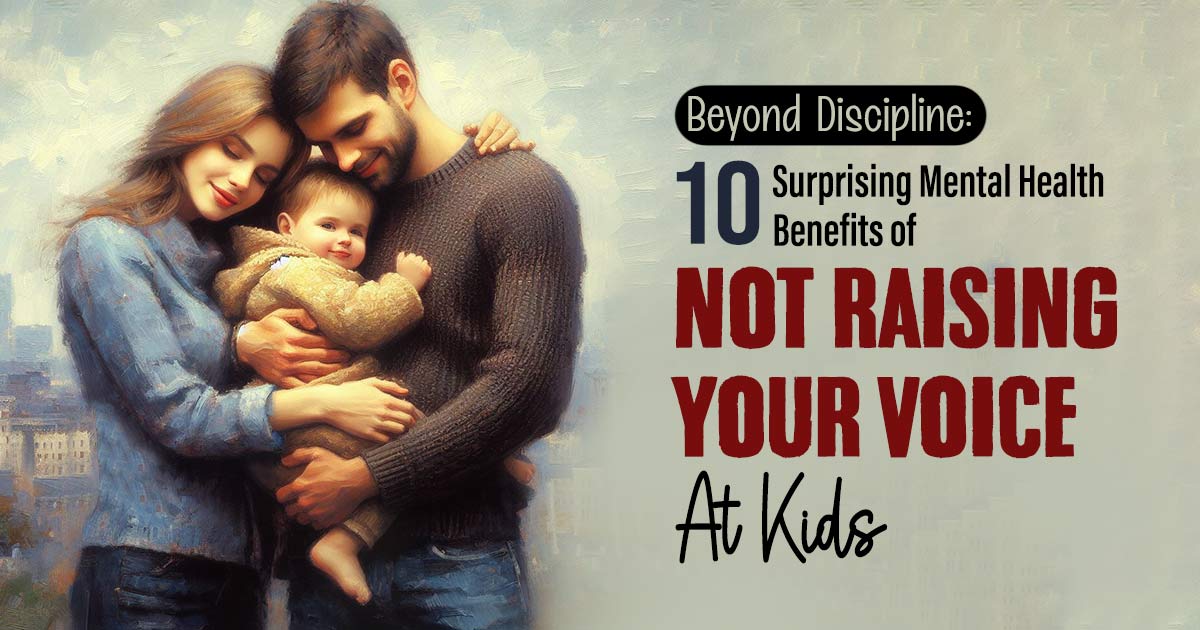Parenting is a profound and challenging journey that significantly shapes the mental and emotional well-being of both children and parents. In the tumultuous sea of parenting, one practice that can have a lasting impact on mental health is the decision not to yell at kids.
While disciplining children is an essential aspect of parenting, choosing alternative methods that involve not yelling at kids can yield profound mental health benefits for both parents and their children.
Understanding The Impact Of Yelling On Mental Health
Yelling, often driven by frustration or stress, can create a hostile and tense environment within the home. It can lead to a cycle of negative emotions for both parents and children, contributing to heightened stress levels and compromised mental health.
Mental Health Benefits Of Not Yelling At Kids
Choosing alternative disciplinary actions to not yelling at kids has multiple mental health benefits:
1. Emotional Regulation
One of the significant mental health benefits of not yelling at kids is the improvement in emotional regulation for both parents and children. Yelling can create an atmosphere of fear and anxiety, hindering a child’s ability to express themselves openly.
In contrast, a calm and composed approach to discipline encourages open communication, allowing children to develop better emotional regulation skills. When parents model emotional regulation, children learn to navigate their own emotions more effectively.
2. Building Trust And Security
Children thrive in environments where they feel safe and secure. Yelling can erode the sense of security within the parent-child relationship. By choosing not to yell, parents cultivate an atmosphere of trust, fostering a strong and secure bond with their children. This sense of security becomes the foundation for positive mental health development in children, as they learn to trust their emotions and express themselves without fear of harsh repercussions.
3. Enhanced Self-Esteem
Consistent exposure to yelling can have detrimental effects on a child’s self-esteem. Negative words and harsh tones can create lasting emotional scars, impacting how children perceive themselves. Opting for constructive communication over yelling helps build a positive self-image in children. When parents provide guidance and discipline without resorting to yelling, children are more likely to develop a healthy sense of self-worth and confidence.
4. Improved Parental Mental Health
The mental health benefits of not yelling extend to parents as well. Choosing alternative methods of discipline reduces parental stress levels, promoting better emotional well-being. Yelling is often a reaction to the overwhelming stressors of parenting, and breaking free from this pattern allows parents to cultivate healthier coping mechanisms. Improved parental mental health positively influences the overall family dynamic, creating a more harmonious household.
5. Effective Communication Skills
Yelling can hinder the development of effective communication skills in both parents and children. When parents choose to communicate calmly and respectfully, children learn the value of expressing themselves in a similar manner. This not only strengthens the parent-child relationship but also equips children with essential communication tools that will serve them well throughout their lives.
6. Positive Role Modeling
Parents are the primary role models for their children. By refraining from yelling, parents demonstrate effective conflict resolution and communication strategies. This positive modeling has a lasting impact on children, influencing how they interact with others and handle challenges in their own lives. Through this, parents contribute to the development of emotionally intelligent and resilient individuals.
7. Long-Term Stress Reduction
Yelling at children can create a cycle of stress and tension within the family, negatively affecting everyone’s mental health. Choosing not to yell contributes to long-term stress reduction, fostering a more relaxed and positive atmosphere. Reduced stress levels benefit both parents and children, creating an environment that supports optimal mental health and well-being.
8. Increased Empathy And Understanding
When parents choose not to yell, they create space for empathy and understanding in their relationships with their children. Empathetic parenting involves recognizing and validating a child’s emotions, fostering a sense of connection. This emotional connection contributes to a more positive parent-child dynamic, where both parties feel heard and understood. Increased empathy promotes mental health by reinforcing emotional bonds and mutual respect.
9. Strengthening The Parent-Child Relationship
A strong and positive parent-child relationship is a cornerstone of healthy mental development. Yelling can strain this relationship, creating distance and resentment. Opting for alternative disciplinary methods strengthens the parent-child bond, promoting a sense of closeness and connection. This emotional closeness becomes a protective factor for children’s mental health, providing a secure foundation for their emotional well-being.
10. Enhanced Problem-Solving Skills
Choosing not to yell encourages the development of effective problem-solving skills in children. Instead of reacting impulsively to stressors, children learn to approach challenges with a calm and rational mindset. This skill set contributes to better mental health outcomes in the long run, as children become adept at navigating life’s complexities with resilience and a positive attitude.The decision not to yell at kids is a powerful and transformative choice that reaps numerous mental health benefits for both parents and their children.
By fostering emotional regulation, building trust, and promoting effective communication, parents contribute to the development of resilient, confident, and emotionally intelligent individuals. As parents prioritize positive role modeling and create an atmosphere of empathy, they lay the groundwork for a healthy parent-child relationship that supports optimal mental well-being. Ultimately, choosing not to yell becomes a beacon of emotional health, guiding families toward a more harmonious and positive future.



